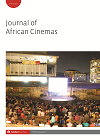
Full text loading...

Censorship decisions on cinematic works in Egypt have been characterized by their inconsistency due to the intentional lack of definition of what would constitute a threat to politics, religion and morality. Such fluidity has forced filmmakers to practise self-censorship and deterred them from tackling Coptic problems for fear of igniting sectarianism, as censorship would claim. This article shows the role of public opinion during the period of political instability and aspiration for freedom after the 25 January 2011 Egyptian Revolution in facilitating the approval of the controversial script of Amr Salama’s Excuse My French (2014), which deals with the issue of discrimination against minority Copts in public schools, after five rejections by the censors.

Article metrics loading...

Full text loading...
References


Publication Date:
https://doi.org/10.1386/jac_00053_1 Published content will be available immediately after check-out or when it is released in case of a pre-order. Please make sure to be logged in to see all available purchase options.